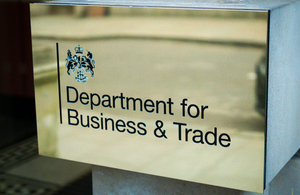Government to modernise product safety laws to ensure they’re fit for the digital age
The UK’s product safety laws – which are over 30 years old – are set to be overhauled in a bid to make them fit for emerging technologies and new shopping habits.

- Product safety laws to be overhauled to better protect consumers when shopping online and buying modern products like smart devices
- Reformed furniture and fire safety regulations will better protect consumers in the modern home including a reduction in the use of harmful chemicals
- Plans will cut business costs and reduce unnecessary red tape with the introduction of measures like electronic labelling, enabling them to invest more in their own firms
The UK’s product safety laws – which are over 30 years old – are set to be overhauled in a bid to make them fit for emerging technologies and new shopping habits, the government has announced today (Wednesday 2 August).
Much of the UK’s product safety regime has been underpinned by outdated EU laws, with some dating back to 1987. Having left the EU, the UK can now create its own product safety regime to better suit British businesses and ensure consumers have the same protections when shopping online as on the high street.
Today’s consultation will seek views on how the UK can better regulate 21st century innovations like internet connected devices including smart watches and speakers, and artificial intelligence, while ensuring British businesses are not stifled by costly red tape.
Businesses will also save time and money thanks to the government’s proposals to introduce e-labelling – a Brexit benefit and a move that would go further than the EU. This would reduce waste, relieve industry burdens, and allow product information to be easily and regularly updated.
Business Secretary Kemi Badenoch said:
I am determined to use our post-Brexit freedoms to identify outdated EU laws placing unnecessary burdens on business and reform them to benefit both companies and consumers.
These changes will provide better consumer protections while upholding our world-leading safety standards and will also cut costs for business to ensure they have the freedom they need to innovate and thrive, helping to create jobs and grow the economy.
In addition to the Product Safety Review, we will be launching a consultation on a proposed new approach to the fire safety of domestic upholstered furniture. This will be aimed at improving fire safety standards for consumers and addressing modern day domestic hazards.
Tina McKenzie, Policy Chair of the Federation of Small Businesses (FSB) said:
We welcome measures to ease the burden on small businesses while ensuring high safety standards. Regulatory requirements should be designed to be as consistent and straightforward as possible to reduce the costs of compliance for small firms.
The complexity of the current UK product safety system means that firms, especially new entrants and small businesses, can struggle to understand their obligations, resulting in hindered growth and hampered consumer choice.
The National Fire Chiefs Council:
The National Fire Chiefs Council welcome the consultation and the opportunity to be involved. We are supportive of the draft essential safety requirements as they seek to maintain and improve fire safety. This is demonstrated through the focus of stopping and delaying ignition to aid escape in the event of a fire.
A Silentnight spokesperson said:
We welcome the publishing of the new approach for consultation. We believe proposals such as representative final product testing will improve both fire and product safety, curtailing the endemic use of chemical flame retardants within the industry. Moreover, the essential safety requirements have the potential to galvanise innovation within the sector, facilitating adoption of a circular economy and achieving Net Zero.
In addition to the recent extension of CE marking, these reforms have the potential to have a hugely positive impact on hundreds of thousands of businesses in the UK currently impacted by outdated and cumbersome regulations, with the overwhelming majority of these being small or micro businesses.
The UK government is on course to have passed legislation by the end of this year which will revoke or reform more than 2,000 pieces of Retained EU Law. This comes after an earlier raft of announcements similarly aimed at helping consumers to clamp down on subscription traps and fake reviews.